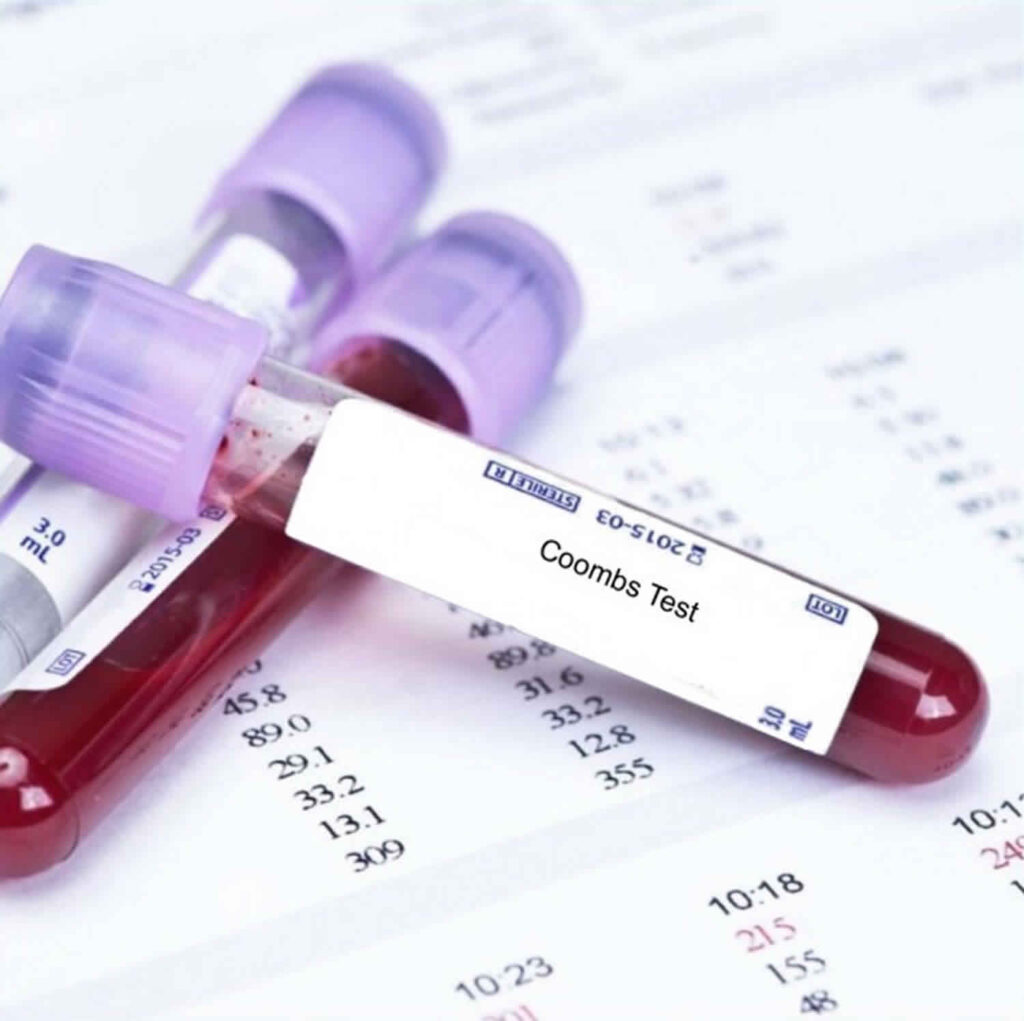Coombs test in Hyderabad
The Coombs test, also known as the antiglobulin test, is a laboratory test used to detect antibodies that act against the surface of red blood cells. It is widely used in immunohematology and can help diagnose various conditions involving the immune system and red blood cells.
At Medintu Hyderabad, your health is our priority. It designed to provide accurate results in a less time. The presence of agglutination in either test indicates a positive result, suggesting the presence of antibodies or complement proteins that could cause immune-mediated hemolysis. We’re here to make it convenient for you, with multiple locations and hassle-free appointments. Trust Medintu for your healthcare needs, because your well-being matters.

Fill the form
Symptoms for coombs test
- Abnormal paleness or lack of colour of the skin.
- Yellowish skin, eyes, and mouth (jaundice)
- Dark-colored urine.
- Fever.
- Weakness.
- Dizziness.
- Confusion.
- Can’t handle physical activity.
Vitamin D Test Price
Why Choose Medintu?

9,40,000+
Blood Tests done

Believed By
Doctors

NABL & ICMR
Certified labs

Home Collection
Affordable Home Blood
What is the Coombs test?
The Coombs test, also known as the antiglobulin test, is a laboratory test used to detect antibodies that can bind to the surface of red blood cells and cause their destruction. This test is crucial in immunohematology for diagnosing various conditions involving immune-mediated hemolysis. There are two main types of Coombs tests: the Direct Coombs Test (DAT), which detects antibodies or complement proteins that are already attached to the red blood cells, and the Indirect Coombs Test (IAT), which identifies free-floating antibodies in the patient’s serum that can bind to red blood cells. These tests are used in diagnosing autoimmune hemolytic anemia, hemolytic disease of the newborn, and transfusion reactions, as well as in prenatal testing and ensuring blood compatibility before transfusions.
Why is the Coombs test performed?
The Coombs test is performed to diagnose conditions where the immune system is involved in the destruction of red blood cells. This includes autoimmune hemolytic anemia, where the body mistakenly attacks its own red blood cells, and hemolytic disease of the newborn, where maternal antibodies attack fetal red blood cells. It is also used to detect transfusion reactions, where the recipient’s immune system reacts against transfused blood, and to ensure blood compatibility before transfusions. Additionally, the Coombs test is used in prenatal testing to identify potentially harmful antibodies in a pregnant woman’s blood that could affect the fetus. Overall, the Coombs test helps in identifying and managing conditions that involve immune-mediated damage to red blood cells, ensuring proper treatment and preventing complications.
Procedure for coombs test
The Coombs test, also known as the antiglobulin test, involves specific procedures depending on whether it’s a Direct Coombs Test (DAT) or an Indirect Coombs Test (IAT). Here’s an outline of each procedure:
Direct Coombs Test (DAT)
- Sample Collection:
A blood sample is collected from the patient suspected of having immune-mediated hemolysis.
- Preparation of Red Blood Cells (RBCs):
Red blood cells from the patient’s sample are washed multiple times to remove any plasma or unbound antibodies that could interfere with the test.
- Incubation with Coombs Reagent:
The washed red blood cells are mixed with Coombs reagent, which contains antibodies against human immunoglobulins and complement proteins.
- Observation for Agglutination:
The mixture of red blood cells and Coombs reagent is observed for agglutination (clumping). Agglutination indicates that antibodies or complement proteins are bound to the surface of red blood cells.
- Interpretation of Results:
If agglutination occurs, the test is considered positive, indicating the presence of antibodies or complement proteins on the patient’s red blood cells.
patient’s serum that can react with specific antigens on red blood cells.
Popular lab tests near you in Hyderabad
Other Health Services in Hyderabad
At Home Health Services
X-ray at Home in Hyderabad / Ecg at Home in Hyderabad / Doctor at Home in hyderabad/ Injection at Home in Hyderabad/ Blood test at home
Physiotherapy at home in Hyderabad / Home Care services in hyderabad / Vaccination at home in Hyderabad / Ultrasound scan in hyderabad /Ct Scan in hyderabad
Medical Equipments for rent
Hospital Beds on rent in Hyderabad / Wheelchair on rent in Hyderabad / Walker on rent in Hyderabad / Oxygen Concentrator on rent in Hyderabad
FAQs
What conditions can a positive Coombs test indicate?
A positive Coombs test result indicates the presence of antibodies or complement proteins that can lead to the destruction of red blood cells. It may be seen in autoimmune hemolytic anemia, HDN, transfusion reactions, and certain infections.
Can a Coombs test be false positive?
Yes, a Coombs test can sometimes yield false-positive results. Factors such as improper sample handling, contamination, or technical errors in the laboratory can contribute to false positives.
What is the cost of the Coombs Test?
The cost of a Coombs test varies from 200 to 500 rupees depending on the area, doctor, laboratory, and so on.
What conditions can a positive Coombs test indicate?
A positive Coombs test result indicates the presence of antibodies or complement proteins that can lead to the destruction of red blood cells. It may be seen in autoimmune hemolytic anemia, HDN, transfusion reactions, and certain infections.
